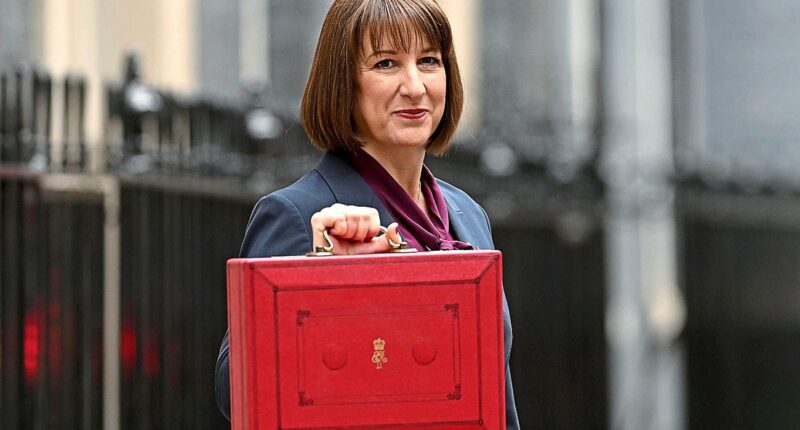Share this @internewscast.com
Britain is experiencing the highest inflation levels within the G7 nations due to Labour’s struggles in transforming the UK into the quickest growing major developed country worldwide, as noted by the International Monetary Fund.
This poses a challenge for Rachel Reeves before the upcoming Budget, since the global authority has predicted UK inflation rates of 3.4% for this year and 2.5% by 2026.
That is higher than anywhere else in the G7 – outstripping price rises in the United States, Germany, France, Italy, Canada and Japan.
Experts have issued warnings that persistently high inflation, partly fueled by the tax increases and additional costs imposed on businesses by the Chancellor, complicates the Bank of England’s ability to lower interest rates.
And in a further blow to Ms Reeves, the IMF indicated that Labour is failing in its pledge to deliver the fastest growth among the group of seven.
The IMF’s report, released during its annual meetings in Washington DC, coincided with official statistics revealing that unemployment has escalated to a four-year peak of 4.8% under Labour’s tenure.
The Office for National Statistics (ONS) highlighted that this surge in unemployment mainly impacted younger individuals, with joblessness among those aged 25-34 reaching its highest since 2020.
Meanwhile, a record number of over-65s – more than 1.7 million – are now in work, according to the figures covering the three months to August.
Shadow Chancellor Sir Mel Stride commented on the situation, stating: ‘The IMF’s evaluation is concerning. The UK’s inflation is predicted to lead the G7 both this year and next, accelerating faster than anticipated due to Rachel Reeves’ policy decisions.’
‘Since taking office, Labour have allowed the cost of living to rise, debt to balloon, and business confidence to collapse to record lows. Taxes are rising to record highs and families are being squeezed from all sides.
‘Working people are feeling the impact every time they shop, fill up the car, or pay their mortgage.
‘Labour should be getting spending under control to bring down borrowing and avoid damaging tax rises, but Starmer and Reeves are simply too weak to do it.’
Britain’s economy outperformed most of its G7 rivals early this year but is now slipping behind as the £40billion of tax increases in last October’s Budget bite into consumer spending and business investment.
Alex Hall-Chen, principal policy advisor for employment at the Institute of Directors, added: ‘A change of policy direction is needed if the government is to meet its target of stimulating growth and supporting businesses to create jobs.’
But a further tax raid – possibly to the tune of £30billion on some estimates – now seems likely in the Budget next month as the Chancellor struggles to fund her lavish spending plans and expansion of the state.
At the same time, the UK’s dismal inflation performance will limit the Bank of England’s capacity to cut interest rates from the current level of 4 per cent in a blow to millions of families hoping for cheaper mortgages.
Russ Mould, investment director at AJ Bell, said: ‘The UK has an inflation problem which could constrain the Bank of England’s ability to steadily cut interest rates. That could weigh on consumers and businesses, potentially leading to more sluggish economic growth.’
The IMF said it now expects the UK economy to grow by 1.3 per cent this year and next – leaving it behind Donald Trump’s America in 2025 and both the US and Canada in 2026.
The only comfort to be drawn from the report is that Britain’s service dominated economy is doing considerably better than Germany, which is in recession territory, and France which barely is growing. Germany is projected to expand by just 0.2 per cent this year and 0.9 per cent in 2026.
The Chancellor latched onto a 0.1 percentage point rise in this year’s growth forecast for the UK, though she chose to ignore the downgrade of the same magnitude for 2026.
‘This is the second consecutive upgrade to this year’s growth forecast from the IMF. It’s no surprise, Britain led the G7 in growth in the first half of this year, and average disposable income is up £800 since the election,’ Ms Reeves said.
Reeves failed to note that her trumpeted increase in incomes will be eaten up by the failure to get a grip on surging food and energy costs.
‘Inflation forecasts are revised upward in quite a few economies,’ said the IMF in its World Economic Outlook. ‘The most notable cases are the United Kingdom and the United States. In the UK, headline inflation, which started picking up in 2024, is expected to continue rising in 2025 partly because of changes in regulated prices.’
Regulated prices are those directly controlled by the government such as environmental levies, energy, water, postal and rail charges.
The Fund said that both headline and core inflation ‘surprised on the upside’ in Britain, confounding a previous forecast that prices would moderate.
On a more comforting note, it argues that the projected inflationary bump should be temporary with a loosening labour market and moderating wage growth eventually helping inflation return to the 2 per cent target set by the Treasury by the end of 2026.
The latest IMF projections will offer little comfort to the Chancellor as she begins intense preparations for the November 26 Budget.

Rachel Reeves faces a potential £30billion black hole based on her own fiscal rules, leading to fears of another round of tax rises in November’s Budget
Reeves, who is due to land in Washington on Tuesday, is understood to be disappointed by the early projections for productivity and output from the Office of Budget Responsibility.
Early reports showing a potential £30billion black hole largely to be filled by further, still unknown, tax increases.
The Fund is deeply concerned by budget deficits and debt levels in all the advanced economies including Britain.
It warns that the sharp rise in the interest rate returns, the yield, on government bonds represents ‘an abrupt market reaction’ and could have serious impact on market stability and could spread to highly indebted and poorly supervised private markets.
The big shadow over the IMF’s projections for global growth remains the Trump tariffs. It suggests that Britain may benefit from its early deal with the Trump White House but remains cautious about the longer-term impacts for the world.
Trade policy uncertainty remains elevated in the absence of clear agreements, the Fund said.
The situation has worsened in the last several days with China imposing barriers on rare earths and Mr Trump threatening a new 100 per cent sent retaliatory tariff on November 1 unless Beijing retreats.
Despite a small upgrade in world growth prospects for this year to 3.2 per cent, the IMF leaves no doubt that ii fears protectionist measures could savage investment decisions by companies and worsen an already baleful outlook for growth and prosperity.
SAVE MONEY, MAKE MONEY
Sipp cashback

Sipp cashback
£200 when you deposit or transfer £15,000
4.51% cash Isa
4.51% cash Isa
Trading 212: 0.66% fixed 12-month bonus
£20 off motoring

£20 off motoring
This is Money Motoring Club voucher
Free shares bundle

Free shares bundle
Get free UK shares worth up to £200
4.37% Isa with bonus

4.37% Isa with bonus
Now with no penalty for withdrawals
Affiliate links: If you take out a product This is Money may earn a commission. These deals are chosen by our editorial team, as we think they are worth highlighting. This does not affect our editorial independence. Terms and conditions apply on all offers.

















